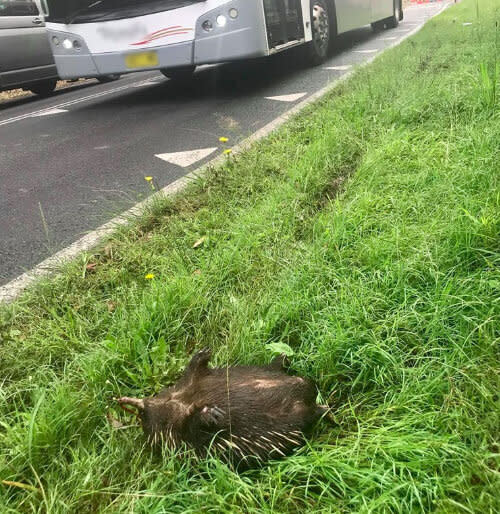Wildlife rescuers' plea to motorists if they accidentally hit wildlife on road
WARNING: DISTRESSING CONTENT - Wildlife rescuers are calling for more awareness on the roads after observing an increase in injuries and death inflicted on native wildlife.
Melbourne-based wildlife rescuer Krysti Severi took to Facebook this week to share distressing footage of a kangaroo unable to stand after a collision with a vehicle in Epping this week.
She told Yahoo News Australia that it’s critical motorists don’t gauge a kangaroo’s wellbeing by its ability to hop off afterwards.
“They’ll go on with adrenalin, it’s their fight or flight instinct and they’ll head off to try and find a safer environment,” Ms Severi explained.
In the clip she shared, the roo can be seen trying to stand on its two legs but repeatedly collapses to the ground in a paddock several meters from the road.

It had suffered serious injuries from the collision, including a snapped leg.
“Their bones are very fragile, they’re not designed to be hit at 80km per hour,” she pointed out.
Urbanisation leads to ‘horrible’ suffering
She said urbanisation of Melbourne’s outer suburbs had led to a “horrible” increase in suffering for local wildlife with people lacking the knowledge of what to do when they hit animals on the roads.
She said areas such as Epping are now being used as thoroughfares by commuters and with kangaroos being forced out of their natural habitats, the two combined is proving devastating for the marsupials.
“They’re just not in paddocks anymore, they’re locked into development areas, they’re boxed in. They don’t know where to go,” Ms Severi said.
She told Yahoo News Australia that if action isn’t taken over injured wildlife, they can endure a long and painful death which can take over a week.
“They can also be eaten alive by foxes,” she added, with many injured kangaroos also carrying joeys.
Ms Severi is calling on drivers to take simple steps which could save multiple lives.
“Slow down. Be aware of where you do live and if you know there have been kangaroos in that area, slow down.”
She said if drivers do hit animals they should pull over immediately and simply drop a pin on a map app and send it to a wildlife rescuer.
“They’re very dedicated, they will go out and look for the animal and end their suffering.”
Action taken in NSW
Emergency veterinary nurse Tanya Middleton is in the process of opening a dedicated wildlife hospital to deal with the problem in northern NSW.
The wildlife expert, based on the Central Coast, highlighted the tragic dangers of the roads for wildlife with a recent viral post on Facebook which pictured an echidna dead on the side of the road in Byron Bay.

From her judgement, it appeared the echidna, which had a broken beak, had endured prolonged suffering, most likely due to inaction from motorists.
“Even if I had of gotten there earlier, really it would have made little difference to his survival but I could have helped ease his suffering,” she explained.
“Death I can deal with, suffering I can’t.”
Ms Middleton told Yahoo News Australia that it’s more than understandable for drivers to be hesitant and scared when tasked with helping injured wildlife.
“Running over an animal is scary and picking one up is scary because they bite and scratch,” she said.
She said if a motorist is unable to help, they must think about calling wildlife rescuers such as WIRES who can act and either save its life or at least end its suffering.
“People must stay safe on the roads ultimately,” she said, reminding motorists not to risk their lives for the sake of an animal.
If feasible, she advised people to pick wounded animals up in a towel and placing them in a cardboard box for either volunteers to collect or taking them directly to the nearest vet.
She urged motorists to remember that humans are often intruders in natural habitats.
“Its very sad obviously, there’s so much development going on and the native animals don’t have anywhere to go,” she said.
“We build these roads through their habitat.”
Anyone who injures wildlife or discovers injured wildlife can either call WIRES on 1300 094 737 or search for their nearest wildlife rescuer or vet online.
Do you have a story tip? Email: newsroomau@yahoonews.com.
You can also follow us on Facebook, download the Yahoo News app from iTunes or Google Play and stay up to date with the latest news with Yahoo’s daily newsletter. Sign up here.



